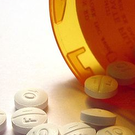Heparin, Warfarin, And Aspirin Are Equally Effective In Preventing Blood Clots In Myeloma Patients Receiving Thalidomide (EHA 2010)

In a recent Phase 3 study, low-molecular weight heparin, warfarin, and aspirin were found to equally prevent the formation of venous blood clots in newly diagnosed multiple myeloma patients who received thalidomide as part of their initial treatment.
The results of this Phase 3 study were presented at the European Hematology Association (EHA) meeting in Barcelona, Spain.
While the three drugs were equally effective in the prevention of blood clots, Dr. Antonio Palumbo of the University of Turin, Italy, suggested in an email to The Myeloma Beacon that aspirin may be the more preferred drug of the three due to its convenience.
Treatment with thalidomide (Thalomid) is generally associated with an increased risk of blood clot formation in the veins. In order to prevent this complication, multiple myeloma patients who receive thalidomide treatments are also often administered one of three blood-thinning drugs: low-molecular weight heparin (LMWH), warfarin (Coumadin), or aspirin.
In their study, the Italian researchers investigated the relative effectiveness of these three drugs in preventing blood clots in multiple myeloma patients receiving thalidomide-based therapy.
The study included 991 newly diagnosed myeloma patients who were divided into four different treatment groups. Each group received a different initial therapy, three of which included thalidomide. Study participants who received thalidomide as part of their initial myeloma treatment also received either warfarin, aspirin, or LMWH.
To determine the relative effectiveness of LMWH, warfarin, and aspirin, the researchers evaluated the rate of blood clot formation among patients as well as the rate of related complications, including heart-related events, bleeding, and death. In addition, the researchers investigated the time to onset of blood clot formation among patients.
The researchers found that 5 percent of patients receiving LMWH developed blood clots compared to 8 percent of patients receiving warfarin and 6 percent of patients receiving aspirin. The researchers did not consider the differences between the treatments statistically significant.
Similarly, the differences in the median time to onset of blood clot formation were not statistically significant for the three treatments. The median time for patients receiving LMWH was 4.7 months and 2.4 months for both warfarin and aspirin.
The rate of heart-related complications for patients receiving LMWH, warfarin, and asprin were 2 percent, 0.5 percent, and 1 percent, respectively. These differences were not considered significant.
The risk of bleeding complications was higher, yet not statistically significantly, with asprin (3 percent) than with warfarin (1 percent).
The rate of combined blood clotting, heart-related complications, and bleeding was similar across all three drugs: 9 percent for the LMWH group, 10 percent for the aspirin group, and 9.5 percent for the warfarin group.
The researchers concluded that all three agents were equally effective in preventing blood clots that may be caused by thalidomide treatment. The rates of clotting and its related complications for all three agents remained below 10 percent, a value that the researchers described as “not superior to that expected during the natural course of multiple myeloma.”
For more information, please see abstract 0941 at the EHA meeting website.
Related Articles:
- None Found


As a myeloma survivor who developed a blood clot, was given heparin and then developed a second blood clot, please consider therapies other than heparin, aspirin or wafarin. Please consider fish oil, nattokinase, curcumin and mild exercise to prevent blood clots. These therapies have anti-cancer action as well.
http://multiplemyeloma.peoplebeatingcancer.org/pbc/search?pbc_sitename=All&keys=dvt%2C+vte%2C+blood+clots
David Emerson